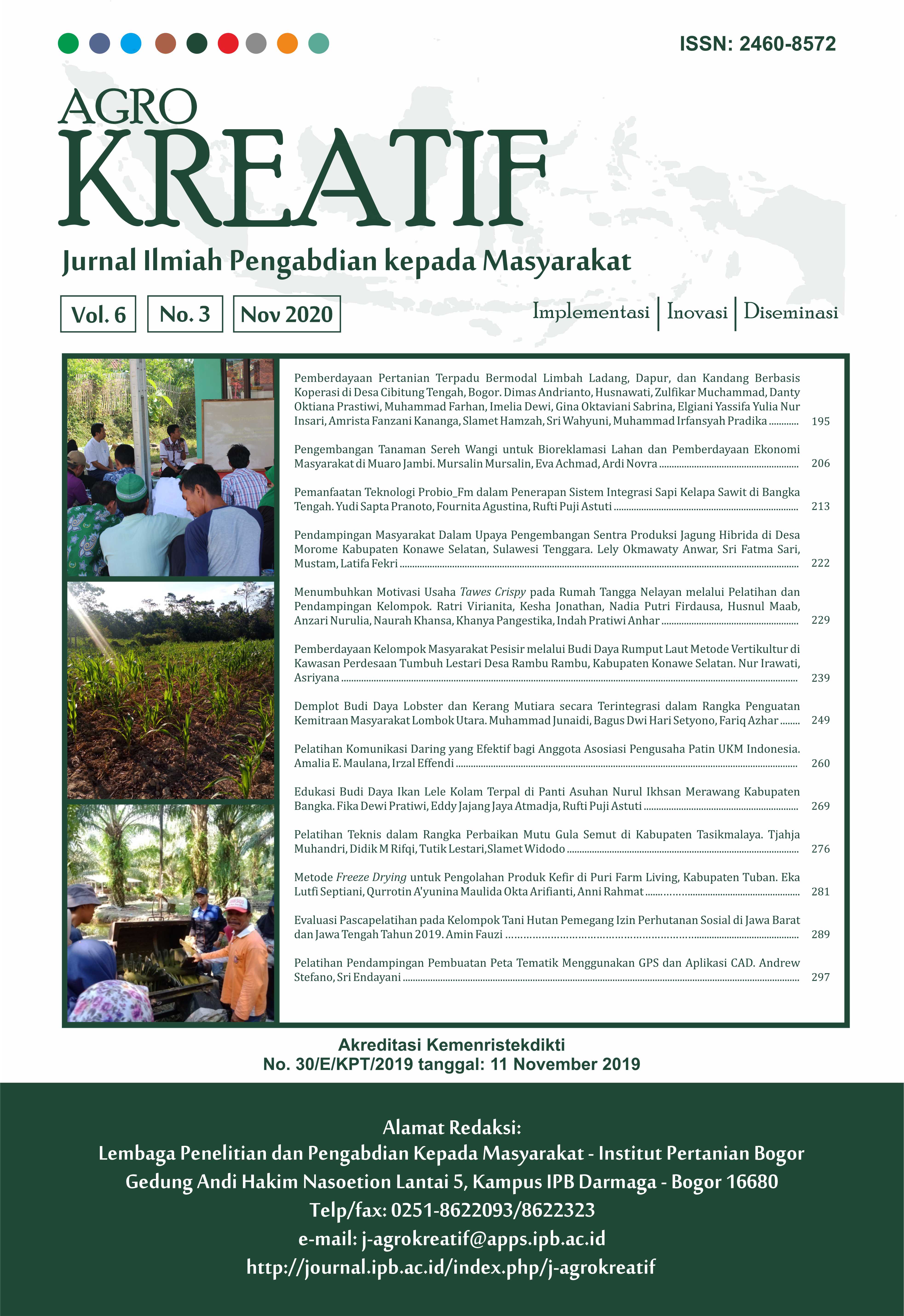Menumbuhkan Motivasi Usaha Tawes Crispy pada Rumah Tangga Nelayan melalui Pelatihan dan Pendampingan Kelompok
Abstract
Tawes (Barbonymus gonionotus) is top local potential in Wonogiri District, especially in Watupecah Hamlet, Gedong Village, Ngadirojo Subdistrict. The low marketability and storability of tawes requires innovation in fish processing of tawes into tawes crispy chips (taspy) to increase the marketability of tawes which then be a business oppurtunity for fishermen households to increase their income. However, inovation itself is not enough to increase fishermen household income, it requires effort to build business motivation in fishermen households to take business opportunity. This community service program aimed to know the success of training and group mentoring as an effort to foster business motivation of fishermen households. The program was carried out using intensive training and group mentoring methods for 33 fishermen households in Watupecah Hamlet covering the development of business motivation, time and behavior management, processing and marketing of taspy products. The results of the program showed that there was a changed in fishermen's knowledge and motivation on the aspect of innovation, dreams, and financial management. The success of this program is evidenced by the growth of the business motivation of fishermen households based on data analysis before and after the implementation of the program. It can be concluded that training and group mentoring are effective techniques in fostering business motivation of fishermen households. Through training and group mentoring the fishermen had chance to dialogue, share suggestion and opinions, cooperate, and interact positively with each other in a comfortable atmosphere as to support the growth of stronger ebusiness motivation of fishermen households.
Downloads
References
Aidha Z. 2016. Pengaruh Motivasi terhadap Minat Berwirausaha Mahasiswa Fakultas Kesehatan Masyarakat Universitas Islam Negeri Sumatera Utara. Jurnal Jumantik. 1(1). 42‒59.
Bukit H. 2016. Meningkatkan Motivasi Belajar Siswa dengan Menggunakan Model Kooperatif Tipe Student Teams Achievement Devision (STAD) pada Mata Pelajaran IPS di Kelas V SDN 107402 Saentis. Elementary School Journal Pgsd Fip Unimed. 5(2): 56‒63. https://doi.org/10.24114/esjpgsd.v5i2.4470
Chrisdwiniati OB, Sulandjari S. 2015. Pengaruh Penambahan Daging-Tulang Ikan Tawes Dan Kondisi Ikan Terhadap Sifat Organoleptik Samiler. Jurnal Online Tata Boga. 4(3): 99‒106.
Diana F, Safutra E. 2018. Pengaruh Pemberian Pakan Alami yang Berbeda pada Benih Ikan Tawes (Barbonymus gonionotus) terhadap Pertumbuhan dan Kelangsungan Hidup. Jurnal Akuakultura. 2(1). 1‒9. https://doi.org/10.35308/ja.v2i1.769
Doran GT. 1981. There’s a S.M.A.R.T Way to Write Management’s Goals and Objectives. Management Review. 70. 35‒36.
Goldsmith EB. 2010. Resource management for individuals and families. New Jersey (GD): Pearson Education, Inc.
Ilik ME. 2010. Bisnis Jamur Tiram di Rumah Sendiri. Bogor (ID): IPB Press.
Indrizal E. 2014. Diskusi Kelompok Terarah. Jurnal Antropologi: Isu-Isu Sosial Budaya. 16(2): 75‒82. https://doi.org/10.25077/jantro.v16.n1.p75-82.2014
Karsidi R. 2002. Pemberdayaan Masyarakat Petani dan Nelayan. Dalam: Semiloka Pemberdayaan Masyarakat di Jawa Tengah dalam rangka Pelaksanan Otoda, Badan Pemberdayaan Masyarakat Jateng. Semarang (ID): 4‒6 Juni 2002.
Machfoedz M, Machfoedz M. 2004. Kewirausahaan: Suatu Pendekatan Kontemporer. Yogyakarta (ID): YKPN.
Marpaung LL, Wardhana A. 2017. Analisis Faktor Motivasi Berwirausaha Mahasiswa Adminis-trasi Bisnis Angkatan 2013 Universitas Telkom. e-Proceeding of Management. 40 (1). 909‒914.
Maryani I, Ahda M, Jatmika SED. 2018. Efektifitas Pendampingan Kelompok dalam Meningkatkan Motivasi Berwirausaha Peternak Sapi Perah. Jurnal Pengabdian dan Pemberdayaan Masyarakat. 2(1): 7‒13. https://doi.org/10.30595/jppm.v2i1.2059
Miarso Y. 2004. Menyemai Benih Teknologi Pendidikan. Jakarta (ID): Prenada Media.
Pratama R, Sukendi, Alawi H. 2019. Pengaruh Padat Tebar dan Jenis Pakan terhadap Pertumbuhan dan Kelulushidupan Larva Ikan Tawes (Barbonymus gonionotus). Jurnal Online Mahasiswa (JOM) Bidang Perikanan dan Ilmu Kelautan. 7(2): 1‒11.
Pusat Data Statistik dan Informasi Sekretariat Jenderal Kementerian Kelautan dan Perikanan. 2013. Profil Kelautan dan Perikanan Provinsi Jawa Tengah untuk Mendukung Industrialisasi Kp. Sekretariat Jenderal Kementerian Kelautan dan Perikanan, Semarang (ID).
Rogers EM. 2003. Diffusion of Innovations. Fifth Edition. New York (US): Free Press.
Sugiono A. 2009. Manajemen Keuangan untuk Praktisi Keuangan. Jakarta (ID): Grasindo.
Sutarto J, Mulyono SE, Nurhalim K, Pratiwi H. 2018. Model Pemberdayaan Masyarakat Melalui Pelatihan Kecakapan Hidup Berbasis Keunggulan Lokal Desa Wisata Mandiri Wanurejo Borobudur Magelang. Jurnal Penelitian Pendidikan. 35(1): 27‒40.
U’rfillah U, Muflikhati I. 2017. Motivasi Berwirausaha, Manajemen Waktu, Manajemen Keuangan, dan Prestasi Akademik pada Mahasiswa Wirausaha. Jurnal Ilmu Keluarga dan Konsumen. 10(1): 71‒82. https://doi.org/10.24156/jikk.2017.10.1.71
Winkel S. 1991. Psikologi Pengajaran. Jakarta (ID): Grasindo
This work is licensed under a Creative Commons Attribution-NonCommercial 4.0 International License.



















